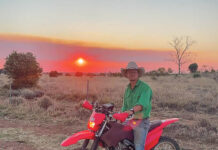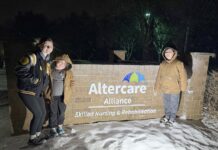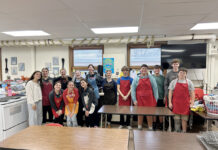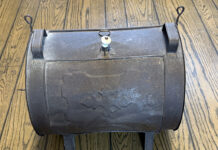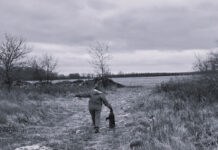
Editor’s Note: This is the third part of a series detailing the Hurricane Helene and Hurricane Milton relief efforts of Farm and Dairy Managing Editor Sara Welch and her childhood best friend Jessica Malek.
Jess and I traveled all day, through North Carolina, South Carolina and Georgia and into Florida on Saturday, Oct. 12. We planned gas stops and filled up before pumps ran dry near Citra, Florida around 7:30 p.m. — over 136 miles from St. Petersburg.
We arrived at our destination, Galilee Missionary Baptist Church, shortly before 10 p.m., and met the four men who arrived at On Mission Network’s base of operations before us. Three of them hailed from various parts of Texas, and the individual leading operations — our contact — flew in days prior from southeastern Ohio.
They asked us if we needed help bringing our stuff in, showed us to the room we’d be staying in and we went to bed.
The next morning, Sunday, Oct. 13, Jess and I woke early, walked the neighborhood and decided to start clearing tree limbs out of the parking lot outside of the church. With signs of both Hurricane Helene’s and Hurricane Milton’s impacts all around — power outages, downed trees, damaged signs and structures — we were eager to get to work.
The others called us back inside for breakfast, during which we got to know more about each other and found out we’d be going to church. After a 2-hour church service, we found ourselves making peanut butter and jelly sandwiches for everyone with the supplies we brought.
About midway through lunch, Jess got impatient and asked what the plan was for the day, halting the light conversation and sharing of stories about past mission trips. We were informed that we would be canvasing neighborhoods, working off a list of church members who needed help with storm cleanup.
Looking over the five-page list, over half the names didn’t include an address. Jess and I split the list after being instructed we would be taking chaperones instead of canvassing together.
I determined a starting point for my portion of the list by narrowing it down to the street with the most addresses. When I hopped in his truck, I informed the man accompanying me of my plan and he said, “I’m going to let you take the lead. You seem like you have this figured out.” I realized I was as qualified as anyone in the group to get people signed up to receive aid.
Most houses sat vacant, waiting for occupants who’d evacuated to return. I quickly discerned if there weren’t people outside cleaning up, no one was home. I started going door-to-door, at first just to the addresses on the list but soon expanded to anyone I saw.
My journalism chops helped me through the process: a short greeting, an introduction, an explanation of the help On Mission Network could offer homeowners, systematically filling out applications, a signature to receive help and a prayer led by the volunteer who came with me. After being invited into a renter’s home and explaining we couldn’t help her without permission from the homeowner, we left her with no more than a couple of the hygiene kits Jess and I brought. I learned to ask anyone I encountered if they were a homeowner first.
I got around 10 homeowners signed up to receive help and passed out even more QR codes for the online application.
However, the entire process felt surreal. It felt awkward to walk past people cleaning their yards with a legal pad and a stack of applications in tow. It was hard to explain to people that I couldn’t help them if they didn’t own their home.
On the way to the truck, an older woman called me into her front yard. She was dragging limbs from her backyard through a narrow path. She wanted to know what kind of help On Mission Network offered and explained that her mother had recently passed away. The house would transfer to her soon and she only needed help getting the larger limbs out of her backyard.
I told her I couldn’t help her, but wrote down her address knowing I would come back to help later.
Jess was waiting in our room to debrief when I got back. She had only brought back three completed applications and was frustrated over how confusing it was to figure out what to say to people. We swapped stories, and I told her about the woman who needed help hauling limbs.
“Let’s go. Let’s go right now. We can help her,” she said.
When we arrived back at the woman’s house, we headed straight for the backyard. We explained we couldn’t help in an official capacity, but we wanted to as fellow human beings. The woman, her daughter and their neighbor laughed, promised not to sue us and gladly accepted our help.
We worked for 45 minutes dragging tree limbs and smaller branches out to the curb. When it came time to cut a thicker branch lying across the trampoline, all we had to work with was a rusty handsaw.
My forearm burned, my shirt stuck to my back and I hadn’t showered in about 60 hours so I stunk. But, after sawing 95% of the way through, we broke the branch in two and hauled it to the curb. The trio thanked us, and we were grateful for the opportunity to help.

At dinner, the men continued reliving their glory days sharing more stories — and some of the same — of past mission trips, and we met a new volunteer from Virginia — others were starting to arrive and kept coming until we left.
After dinner, we washed in the sinks in the women’s bathroom and went back to our room tired, frustrated, and hopeful we’d get to help someone else in the morning.
The next morning, a younger man had arrived from Pennsylvania to help out. We were excited because it was the first person we’d met on this leg of the trip who was close to our age. He seemed to share our sense of urgency to get to work.
On Monday, Oct. 14, we were sent to help two people I had signed up the day before. We cleaned up limbs at the first house. I was upgraded to a sawzall to cut the bigger branches up — still no chainsaws. It took about 45 minutes. Then, we spent the rest of the day “mudding out” Herma’s house.
While I was filling out Herma’s application, she told me about the water that poured into her house during Hurricane Helene’s storm surge. She lay on her bed because she had nowhere else to go. The waterlines on her walls indicated that her house had filled with about 2 feet of water. The 74-year-old had two adult children and a grandson living with her and no homeowners insurance to cover the damage. Her floors needed to be torn out, her kitchen cabinets were ruined and the bottom 3.5 to 4 feet of drywall throughout her house had to be removed.
A brief explanation was given to Herma. We would take all of her belongings that weren’t ruined and already sitting on the curb out of her house. Then we would start the demolition process.
Herma sat in her yard on her walker and watched us work.
We quickly fell into a pattern. The volunteer from Virginia scored the walls with a circular saw. Jess and I followed him from room to room, ripping out drywall. The Pennsylvanian rotated between scraping up tile and disappearing outside on his phone. Then, one of us loaded and pushed a wheelbarrow full of Herma’s house out to the street. With each load, Herma looked more anxious.
As I dragged the wheelbarrow out of her house over and over, I wondered if Herma understood how extensive “mudding out” her house would be before we started. I don’t think I understood. In my heart, I only wanted to help. In my head, it felt like I was tearing apart the home she had lived in for over 30 years.
“Who’s going to fix this?” I thought to myself on repeat.

We made our way from the kitchen and living room at the front of the house to the bedrooms in the back before lunch. Things had gone relatively smoothly. We felt tired and slightly overwhelmed but we still had a lot to do and focused on that.
While we ate lunch, Herma’s daughter came to clear out her room. She and her son had been staying somewhere else because he developed a cough from being in the moldy house. Herma’s son sat in his bedroom where he had been since we started. Jess and I were told he refused to come out or clear out his things and that he suffered from a mental illness — nothing more.
After lunch, we moved cautiously down the hall past his dark bedroom to rip out drywall in his sister’s room. As we worked our way down the wall shared with his room, we found what looked like holes he had punched on his side. The more drywall we removed, the more we could smell what could only be described as rot. And it wasn’t from the hurricane damage.
When the bottom piece of drywall came loose and we freed it from the studs, pop cans, CDs, a cassette tape, a Barbie, handwritten notes and what looked like a pile of compost cascaded out of the wall.
I understood, in that moment, it doesn’t take a disaster for people to have less than they need. The full force of all the emotions I spent the day suppressing came to the surface. I felt like running. I didn’t want to see anymore. I didn’t want to pull apart someone else’s life and feel my own discomfort about it.

I looked at Jess. She looked overwhelmed and uncomfortable, too. And there was something else we were feeling, but wouldn’t be able to name until later — shame. Our eyes met, and in an instant, we both knew we needed to regain our composure.
I shoveled the contents of the wall into the wheelbarrow, and she piled drywall on top of it. I dumped it on top of the pile outside that amassed into a heap by the end of the day. We continued ripping out drywall until the room was finished, exposing a 12-inch strip of mold at the bottom of every interior wall, adjacent to a room we hadn’t gotten to yet.
Herma had to leave but expressed concern about her belongings making it back inside before we were finished for the day. So we cleaned up the rooms we had been through — her kitchen, living room and her and her daughter’s bedrooms — and pulled the nails in the living room to bring everything back inside. The modest living room was about half full with everything she had left when we were done.
Before we left, we said a prayer with Herma’s daughter. She thanked us and said she didn’t know what they would have done if we hadn’t come. Then, we headed back to the church.

We cleaned up the best we could without showers and ate dinner with the rest of the volunteers. But we wanted to have a beer to unwind. We invited the young guy from Pennsylvania who spent most of the day on his phone.
Little did we know that we were having a beer with someone who considered himself the most important person in the world. He touted his Ivy League education from the University of Pennsylvania. He dropped enough names to fill a directory. He attempted to regale us with “heroic” stories of his volunteering efforts. He painted a picture of dedication to service, but there was a troubling dissonance beneath the surface. His facade failed to mask his self-importance and motives. He was a disaster relief contractor in town to profit from the suffering of others.
On Tuesday, Oct. 15, we woke early, packed our things, ate breakfast with the growing group and said our goodbyes. We drove to the beach, passing debris painted with calls for help and warnings, sunken boats and roofless Tropicana Field. We met a man showering at the beach and offered him the hygiene kits and food we had left. Then, we went home.
We took turns driving and sleeping over the next 20 hours, feeling exhausted. We made it home around 5 a.m., Wednesday, Oct. 16, with heavy hearts.
Looking back, we didn’t realize the weight of it all, the way it would make us feel about ourselves or the guilt we would have in the days that followed. We didn’t understand going home would feel like leaving people behind.
Related Content
- Part One: Called to help those impacted by Hurricane Helene
- Part Two: Lending a hand at Lower Creek Airport
- Part Four: Coming home



